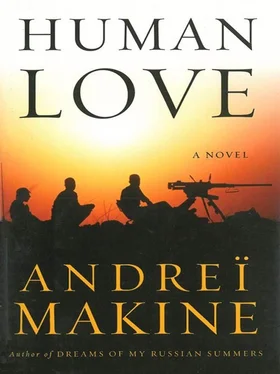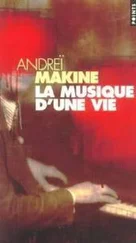He had already taken part in a dozen revolutionary training exercises in that military camp close to Moscow. The scenario would vary: the enemy forces would become better armed and differently deployed, the pitfalls would multiply, the “population” (played by soldiers in civilian clothes) was sometimes cooperative, sometimes hostile. The city itself, an artificial city, a replica of a typical urban layout, with its railroad station, the residence of the head of state, the airport and the rest of the key locations, yes, even these prefabricated blocks, would be rearranged before the next revolution. This made the insurgents’ action more complicated: the station was transformed into a barracks, the secret police headquarters became the American embassy, the approaches to the airport were now protected by minefields… Inside the presidential palace the allocation of rooms was not constant either. The tyrants office could be recognized thanks to a large framed reproduction of The Battle of Borodino . And on the threshold of the children’s room they put that great plastic doll wrapped in grubby tulle, with one arm missing.
In each exercise everything would change. Except for that jar of tomatoes in the studio at the national radio station. And also that unease when it came to firing at the phantom children. One day Elias caught himself imagining faces he had seen in Dondo, in Kivu, in Cuba…
A revolution, the instructors used to say, is not just a matter of explosives. It takes long and meticulous preparation. Initially the “popular masses” must be worked on in depth, creating both networks of fighting men and looser ones of fellow travelers and sympathizers, essential to the success of the uprising. The overthrow of a dictatorship cannot be embarked on without first infiltrating the army and the police, winning the approval, or at least the neutrality, of the intellectuals and the media, and sounding out the diplomatic terrain. But ultimately it is a question of having a nose for it: a people ready to support you, a regime ripe for collapse, these things can be smelled. But it still reeks of explosives, thought Elias, sensing the deeply held conviction of his masters in revolution.
And when your nose failed you, the specialists were there to guide you. These instructors had taken part in the overthrow of plenty of regimes; their experience was undeniable. Professional revolutionaries, Elias reminded himself. On one occasion, they would recount, the kin of the former dictator had been spared; the result: civil war broke out again for another two years. In a coup detat in Central America a banker who should have been subjected to “specific means of pressure” (in plain language, torture or watching the simulated killing of his family) had simply been imprisoned and, after a successful escape, had set about financing a counterrevolution, thanks to his foreign bank accounts (which he would certainly have surrendered under torture). In Southeast Asia, negligence over the execution of a British journalist: instead of using a submachine gun taken from the enemy, the soldiers had given themselves away by using their own service weapons…
At the end of all these sessions on insurrection techniques, so ingenious and ruthless were the tricks designed to outwit ones fellow human beings that Elias found himself asking, What s the point? In the mouths of the instructors these tactics for fighting and subversion became art for arts sake, glorious goals in their own right, which eclipsed the goal of the revolution itself. They would spend their whole lives, Elias told himself, perfecting their methods, like chess players hypnotized by the marquetry of their own chessboards. What’s the point?… He hurriedly silenced this question, unworthy of a professional.
His study of Marx, which he returned to at Patrice Lumumba University, helped him to forget this dilettante questioning for a time. Despite the dogmatic solemnity with which the doctrine was taught, for him it still held the savor of that first intellectual revelation, his gropings under the direction of Carvalho, the vet in Dondo. He absorbed and expounded for the examiners the dialectical thickets of Das Kapital , but what remained in his memory was the somewhat crude clarity of Carvalho s observations: “The world is governed by human beings’ desire to dominate their fellows. Man’s exploitation of man. Marx was right! Look at the Portuguese and the colonized peoples. And the rich Portuguese and the poor Portuguese… No truce can ever be possible.” And he would go on to talk about the class struggle.
And this struggle, Elias now recalled, meant the impaled heads of Angolans displayed alongside the fields, like scarecrows. “For a capitalist,” Carvalho explained, “everything becomes a commodity, everything!” In Das Kapital Elias discovered the secret of this world up for sale. But one step ahead of his comprehension, his memory turned a spotlight on a room painted yellow, where an ugly little soldier, entangled in his lowered pants, hopped up and down in front of a naked, unbearably beautiful black woman. “Commodity – money – commodity,” was Marx’s formula. This naked body transformed into a commodity produced money that, in its turn, became a commodity again: bread brought by the woman to her child, Elias.
… Later on, during his travels in Europe, he would often hear intellectuals referring, with a little sneer of contempt, to “the Marxist Bible.” Then he would remember his studies in Moscow, aware that his fellow students could all have been accused of taking their expositions of Marx too lightly. Except that for them this much-derided Bible carried with it the crushing weight of the dead, the grief of years of battles and humiliations.
One day doubt assailed him in the most unexpected way He had just been masterminding the seizure of the airport in that mock-up of a city in which so many successful revolutions took place. The coach taking them back to Moscow broke down, and his companions in arms, both the “revolutionaries” and the “henchmen of the dictatorship,” set off toward a suburban railroad station. He decided to return on foot, intoxicated by the softness of the snow silvering the empty fields and low roofs of a few mournful houses – the first snow since his arrival in Moscow. The first snow of his life. He had imagined a stinging, numbing cold. Now, feeling these large, almost lukewarm snowflakes brushing against his face, he broke into a joyful smile.
On what was still partly a country road he noticed a very old woman walking so slowly that it looked as if every step she took was set down with great care upon the delicate white embroidery. In a string shopping bag she carried several packets parceled up in coarse gray paper and a loaf wrapped in newspaper. As she made her way around a puddle of water, she steadied herself on the branch of an apple tree that leaned out over the road. Elias suddenly had a profound perception of the moment linking that aged hand with the gnarled bark. The woman stopped, raised her face toward the whirling snow. He believed she was smiling faintly.
He often thought of that woman again. In a world where the poor, fated to be unhappy, were engaged in their class struggle against the rich, who were inevitably brimming over with happiness, it was difficult to find a place for this elderly passerby on the day of the first snow. Was she poor? Certainly. Markedly more deprived, indeed, than the “popular masses” in capitalist societies battling against the bourgeoisie. But was she unhappy? Elias already knew enough about life in Russia to know the extent to which these unremarked lives could be mysteriously replete with meaning. Besides, would she have been happier if her bag had been bulging with food? If, instead of having passed through wars, purges, famines, she had led a calm and fortunate existence somewhere in the West?
Читать дальше









